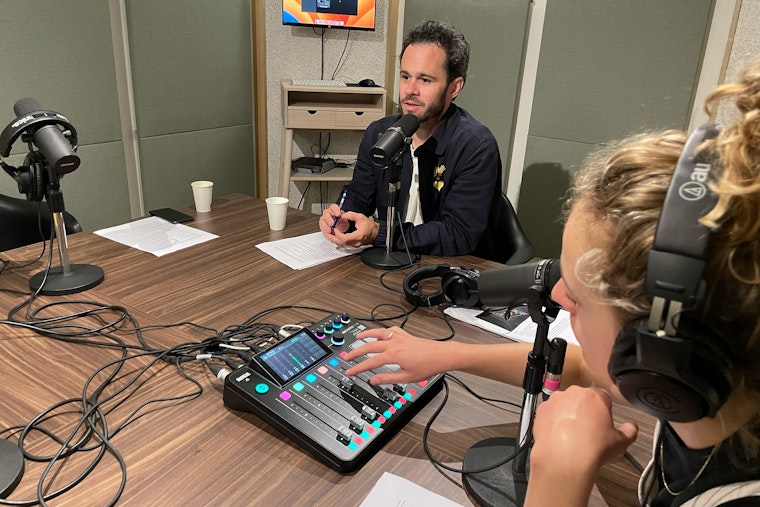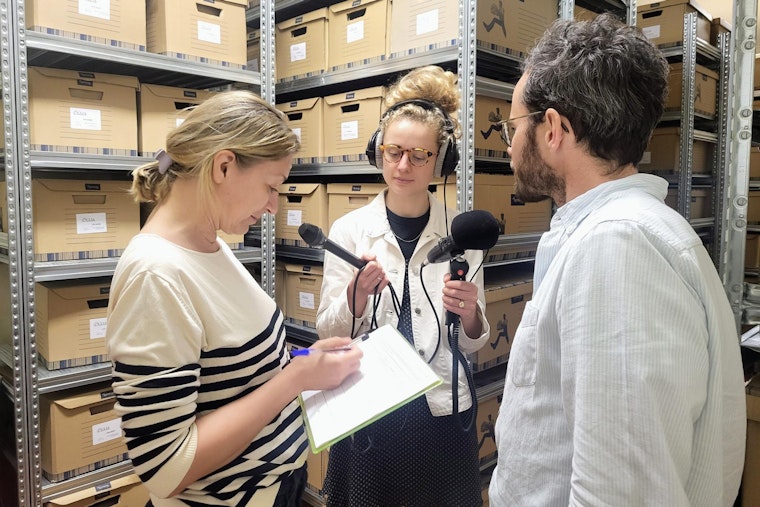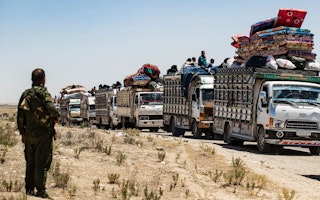A Podcast Gives Voice to Syrians Searching for Justice in Europe
By Fritz Streiff

In June 2015, a car with diplomatic plates leaves France, carrying a group of men across Germany, to the Austrian city of Salzburg. Inside the car, “the group included members of the Austrian Intelligence Service…and a man known only at the time as ‘White Milk’. So who was this mysterious White Milk?”
So runs the introduction to The Syria Trials: The Disappearing General—a new podcast series of 11 episodes my team and I are making focused on the long pursuit of justice for atrocity crimes carried out by the Syrian regime. “White Milk” was the code name for Khaled al-Halabi, a former brigadier general in the Syrian state security service who during the violent repression of the peaceful 2011 revolution was in charge of a security center in the city of Raqqa. Our podcast tells his story—through the words of Syrians who were held in the center, and through the words of international war crimes investigators who have collected evidence of the horrors, including murders, perpetrated under al-Halabi’s command.
The podcast also looks at uncomfortable questions that remain unanswered: why was al-Halabi smuggled into Austria? And why has be not been arrested? As a narrator of the podcast, I tell these stories because they should be known by the larger global public.
This project grew out of a two-year period I spent as a Litigation Fellow at the Open Society Justice Initiative between 2018 and 2020. I was part of the Justice Initiative’s continuing involvement in a broad effort to deliver some measure of justice for atrocity crimes committed by the Syrian regime—despite the inability of the International Criminal Court to pursue investigations or prosecutions there.
Instead, working with Syrian partners and with other international rights groups, we began pursuing other routes to justice. Under the legal principle of universal jurisdiction, violations of international laws can be prosecuted in national courts, even when the crimes did not occur on that state's territory, and neither the victim nor perpetrator is a national of that state. It allows these courts to investigate and prosecute atrocities such as genocide, war crimes, and crimes against humanity—covering not just the direct perpetrators but those responsible for systematic and widespread patterns of crime.
Our efforts included working with Syrian and international partners to prepare evidence that could be presented to public prosecutors to initiate prosecutions against former regime figures. When I finished my fellowship with the Justice Initiative, I remained engaged in the most advanced cases—the effort to prosecute two former intelligence officials, Anwar Raslan and Eyad al-Gharib, who ran a Detention Center in the Syrian capital Damascus known as Branch 251.
Their trial was the first criminal case in a courtroom anywhere against former Syrian regime officials. Recognizing its significance, I decided to launch a podcast that would document the background to the case, and provide regular, easily accessible updates of the proceedings. By catering to both English and Arabic speakers, the Branch 251 podcast was not only able to reach a wider audience, but also the people who need to hear about the trial the most: Syrians.
Ultimately both men were found guilty—in February 2021, the lower ranking al-Gharib was sentenced to four and half years in prison for his role in aiding and abetting crimes against humanity. Then in January 2022, Raslan was sentenced to life in prison for crimes against humanity including murder, torture, and sexual violence. He remains the most senior Syrian official to be held to account for atrocity crimes.

With Branch 251, the podcast production company 75 Podcasts was born, supported by a diverse, talented and multilingual team of producers, writers, journalists, lawyers and hosts. We went on to produce a new series, again in English and Arabic: The Syria Trials, which approaches the topic with a different style. In two 11-episode seasons, it tells the wider stories behind the challenges, frustrations, and hopes that make up the jigsaw puzzle of justice and accountability efforts for Syria. We released the first season during the fall 2022.
While this season closely follows al-Halabi’s story, the stories of his victims and the peaceful protestors form the key narrative on which this fascinating story of hide and seek is built. The English series’s sister edition in Arabic ensures the conversation around such vital topics is both available and owned by Syrian people and communities. While al-Halabi’s story and other legal cases feature in this sibling production, the Arabic series is a conversational podcast in which Syrians discuss those justice priorities that are most pressing to them in this moment of so-called “normalization” of the Syrian regime. The Arabic series is out now, with new episodes being released every week.
For me the podcast experience has been multi-dimensional. Next to enabling more access to these justice processes taking place all over the world, and giving Syrians a platform to own these, their stories, another one of the key reasons why we make these podcasts is to provide access to quality content, counter misinformation, and to document these critical moments in history. Through our website, with individual episode transcripts and fully curated e-books, in English and in Arabic based on the Branch 251 podcast, we want to contribute to archiving for future listeners and readers and a culture of remembrance.
75 Podcasts is a grantee of the Open Society Foundations.
Fritz Streiff is an international criminal and human rights lawyer, currently managing the Ukraine work at the Amsterdam-based Nuhanovic Foundation. He is the founder and project director of 75 Podcasts.
